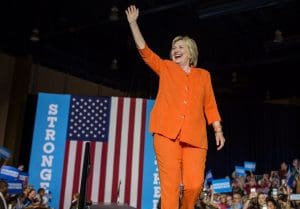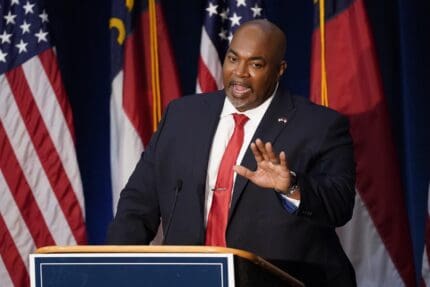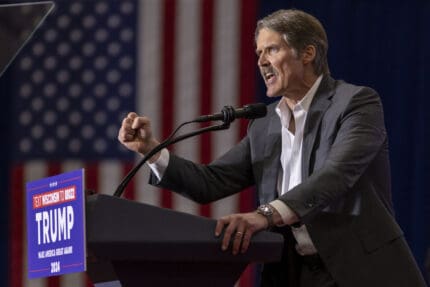James Comey unintentionally handed Hillary Clinton an Election Day gift
The net effect of the vastly overhyped Clinton email story is not as obvious as it seems. The ordinary impulse is to conclude it has been terribly detrimental to her campaign. The reality is much different. Notwithstanding mainstream pundits’ claims that Hillary Clinton should be winning by a gazillion points, she was never going to coast to the White House. Anti-Clinton […]

Notwithstanding mainstream pundits’ claims that Hillary Clinton should be winning by a gazillion points, she was never going to coast to the White House. Anti-Clinton forces in politics and media have long girded themselves for this final showdown, prepared to use virtually any and all means to take her down. That includes direct threats of violence against her and systematic intimidation and marginalization of her supporters.
On September 9th, I argued that it was absolutely unavoidable: “There was going to be a manufactured Clinton scandal in 2016. Her opponents were bound to try to derail her with some fabricated Whitewater-style smear, something the corporate media would sink their teeth into and refuse to let go. It could have been a dozen other trumped-up issues. It ended up being the emails.”
Settling on the emails as their dominant 2016 attack line, Clinton’s detractors made a fateful choice: They chose an issue that can be painted as nefarious but that is fundamentally exculpatory.
Kevin Drum wrote a compelling passage summarizing the FBI investigation:
This [FBI] report is pretty much an almost complete exoneration of Hillary Clinton. She wasn’t prohibited from using a personal device or a personal email account, and others at state did it routinely. She’s told the truth all along about why she did it. Colin Powell did indeed advise her about using personal email shortly after she took office, but she chose to follow the rules rather than skirt them, as Powell did. She didn’t take her BlackBerry into her office. She communicated with only a very select group of 13 people. She took no part in deciding which emails were personal before handing them over to State. She had nothing to do with erasing information on the PRN server. That was a screw-up on PRN’s end. She and her staff all believed at the time that they were careful not to conduct sensitive conversations over unclassified email systems. And there’s no evidence that her server was ever hacked. There’s remarkably little here.
Even more significant than the internal process Drum describes is the actual substance of the emails.
NOT ONE EMAIL FROM HILLARY SHOWED BAD CHARACTER OR INTENT. She made a self-admitted mistake using a private server. THAT'S IT #hillarysemail
— Peter Daou (@peterdaou) October 29, 2016
Not only does the substance of the emails exonerate Clinton, but it provides a window into the work of a profoundly decent, diligent, and detail-oriented public servant.
In January of 2016, Karoli Kuns wrote a personal essay that went on to become one of the most shared pieces of the campaign. It opened with a confession:
I have a confession to make: In 2008, I was one of the most ardent Hillary Clinton haters on the planet. I was ferocious about how much I didn’t want her to win the primaries, and I rejoiced the day she gave her concession speech.
But Kuns gradually warmed to Clinton and described what happened when she read the infamous State Department emails:
In those emails, I discovered a Hillary Clinton I didn’t even know existed.
I found a woman who cared about employees who lost loved ones. I found a woman who, without exception, took time to write notes of condolence and notes of congratulations, no matter how busy she was. I found a woman who could be a tough negotiator and firm in her expectations, but still had a moment to write a friend with encouragement in tough times. She worried over people she didn’t know, and she worried over those she did.
And everywhere she went, her concern for women and children was clearly the first and foremost thing on her mind.
Those sentences describe a process that has unfolded over the course of the election: The more that is uncovered about Clinton’s private correspondence, the more emails and transcripts stolen, hacked and posted online, the better she looks.
Despite breathless headlines and ominous text highlights, all the hype about campaign-ending revelations has amounted to very little.
Holy f——- cow @poniewozik pic.twitter.com/8y6ZLZRSRX
— Eric Roston (@eroston) October 15, 2016
The sudden re-emergence of the emails with less than two weeks to go in the 2016 race has taken the political world by surprise. But will it affect Clinton’s standing with voters?
Consider this nugget buried in a recent NY Times article:
Mr. Trump said he could not “spend more than five minutes talking about her emails at my rallies, because people will lose interest, and you have to talk about other things to keep their attention.”
Trump is conceding the obvious: Clinton’s use of a private email account is the most over-hyped political story in a generation, perhaps in the history of U.S. politics. That is not hyperbole. Our research team took to Lexis Nexis, TVEyes, and Google and came back with a staggering, though unsurprising, conclusion:
Since it broke in March of 2015, the email story has been covered in major news outlets for SIX HUNDRED DAYS.
We’re talking big media outlets, not blogs or local papers: AP, CNN, CNBC, Fox News, New York Times, Washington Post, etc. And more often than not there were multiple mentions across the national media on each of those days.
A Monmouth poll conducted in August found that 63% of Americans are tired of hearing about the issue. I suspect that number has only increased.
In the aftermath of a widely-panned NBC forum, the Washington Post said this:
Judging by the amount of time NBC’s Matt Lauer spent pressing Hillary Clinton on her emails during Wednesday’s national security presidential forum, one would think that her homebrew server was one of the most important issues facing the country this election. It is not.
The American people have a sense of proportionality. 600 days on emails to the exclusion of issues that affect their daily lives makes them more inclined to support Hillary Clinton, not less.
FBI Director James Comey may be under fire for dropping a cryptic letter about the emails 11 days before the election, but the letter is more likely than not a gift for the Clinton campaign.
Trump and the GOP are sure to overreach. The jolt of a new round of unhinged attacks against her will further energize her supporters to go to the polls. And if 600 days of relentless email coverage didn’t derail her, 10 more days won’t do it either.
Recommended

Biden campaign launches new ad focused on Affordable Care Act
Former President Trump has said he wants to do away with the popular health care law.
By Kim Lyons, Pennsylvania Capital-Star - May 08, 2024
Trump leaves door open to banning medication abortion nationwide
Donald Trump is planning to release more details in the weeks ahead about how his administration would regulate access to medication abortion, according to comments he made during a lengthy interview with Time magazine published Tuesday.
By Jennifer Shutt, States Newsroom - April 30, 2024
Biden on abortion rights: President expects to give speech Tuesday on new Florida 6-week ban
‘Having the president of the United States speaking out loud and with confidence about abortion access is a great thing’
By Mitch Perry, Florida Phoenix - April 22, 2024


















































































